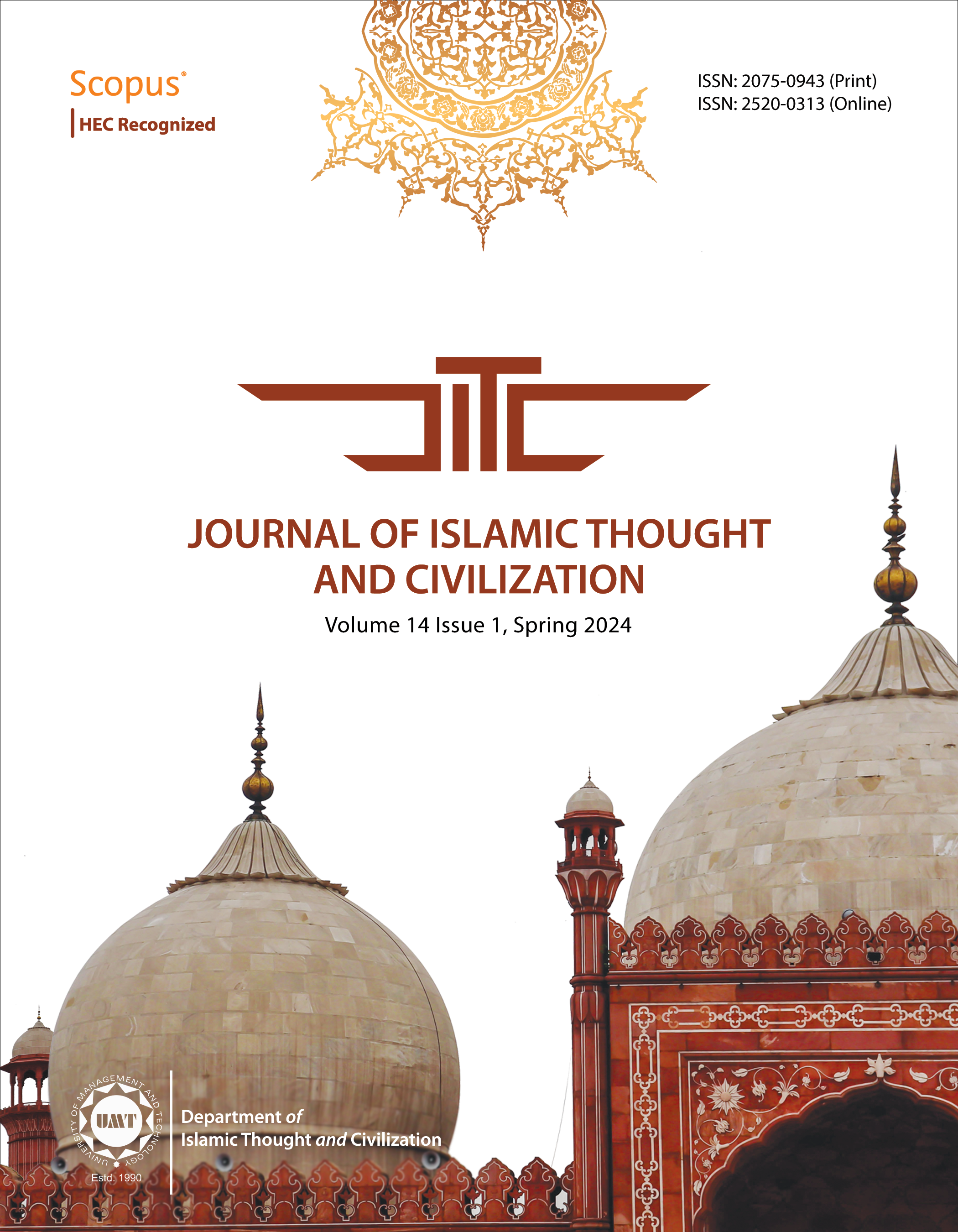Islamic Paradigm of International Relations in Times of Peace and Conflict: A Conceptual Framework
Abstract
 Abstract Views: 0
Abstract Views: 0
This study aims to demonstrate that Islam, as a religion, has an integrated paradigm to deal with international relations. The paradigm includes both peaceful and defensive frameworks applicable during times of peace and conflict, respectively. These two frameworks are based on several foundations and concepts that complement each other to establish the paradigm. The peaceful framework is based on three criteria, namely acquaintance, cooperation, and counseling. While, the defensive framework is based on the reprehension of warfare, the necessity of repelling, and the prioritization of benevolence. The current study seeks to elucidate each of these six concepts and their interconnectedness in shaping the Islamic paradigm of international relations. It relied on inductive and analytical methods to achieve these goals and concluded that Islam’s approach to repelling aggression is primarily rooted in the disapproval of warfare, and that using force is considered a last resort when peace cannot be achieved through other means. Then, when the Muslims are dominant over their opponents, emphasis shifts towards benevolence and tolerance, over seeking justice or revenge.
Downloads
References
Abū Yaʻlá, Muḥammad ibn Al-Ḥusayn. Al-ʻUddah fī uṣūl Al-fiqh [The Equipment of Islamic Jurisprudence]. Riyad: Al-Imam University Press, 1990.
Al-Baghawī, Al-Ḥusayn ibn Masʻūd. Tafsīr Al-Baghawī. Riyad: Dār Ṭaybah lil-Nashr wa-Al-Tawzīʻ, 1996.
Al-Bīṭār, Nadīm. Ḥudūd Al-Huwīyah Al-Qawmīyah [Limits of the National Identity]. Beirut: Bīsān lil-Nashr wa-Al-Tawzīʻ, 2002.
Al-Bukhārī, Muḥammad ibn Ismāʻīl. Ṣaḥīḥ Al-Bukhārī. Damascus: Dār Ibn Kathīr, 1993.
Al-Ghazālī, Abū Ḥāmid. Iḥyāʼ ʻulūm Al-Dīn [Revival of the Islamic Sciences]. Beirut: Dār Al-Maʻrifah.
Al-Jābrī, Muḥammad ʻĀbid. Mashrūʻ Al-Nahḍah Al-ʻArabī [The Project of Arab Renaissance]. Beirut: Markaz, 2016.
Al-Khaṭīb, ʻAbd Al-Karīm. Al-Tafsīr Al-Qurʼānī lil-Qurʼān. Cairo: Dār Al-Fikr, 1970.
Al-Ṭabarī, Muḥammad ibn Jarīr. Tafsīr Al-Ṭabarī. Makkah Al-Mukarramah: Dār Al-Tarbiyah wa-Al-Turāth.
Al-Zamakhsharī, Abū al-Qāsim. Al-Kashshāf ʻan Haqāʼiq Ghawāmiḍ Al-Tanzīl [The Explorer of Mystery of the Holy Qur’ān]. Beirut: Dār al-Kitāb al-ʻArabī, 1987.
Al-Zaylaʻī, ʻUthmān ibn ʻAlī. Tabyīn Al-Haqāʼiq [Clarification of the Truths]. Cairo: Būlāq, 1895.
Asad, Talal. Genealogies of Religion: Discipline and Reasons of Power in Christianity and Islam. London: The Johns Hopkins University Press, 1993.
Catherine, Oder. Mā al-lībrālīyah? al-akhlāq wa-al-siyāsah wa-al-mujtama [What is Liberalism? Ethics, Politics, and Society] Trans. Sanāʼ alṣārwṭ, Beirut: al-Markaz al-ʻArabī, 2020.
Cush, Donnie. Mafhūm Al-Thaqāfah fī Al-ʻUlūm Al-Ijtimāʻīyah [The Concept of Culture in Social Sciences]. Tran. Qāsim Al-Miqdād, Damascus: Ittiḥād Al-Kitāb Al-ʻArab, 2002.
Ibn Abī Shaybah, Abū Bakr. Muṣannaf Ibn Abī Shaybah [Ibn Abī Shaybah's Book on Sunnah]. Riyadh: Dār Kunūz Ishbīliyā, 2015.
Ibn ʻAṭīyah, ʻAbd Al-Ḥaqq ibn Ghālib. Al-muḥarrir Al-Wajīz [The Short Investigation]. Beirut: Dār Al-Kutub Al-ʻIlmīyah, 2001.
Ibn Hishām, ʻAbd Al-Malik. Sīrat Ibn Hishām [Ibn Hishām's Biography of Prophet PBUH]. Egypt: Sharikat Maktabat wa-Maṭbaʻat Muṣṭafá Al-Bābī Al-Ḥalabī, 1375AH.
Ibn Manẓūr, Muḥammad ibn Mukarram. Lisān Al-ʻArab [The Arab's Tongue]. Beirut: Dār Ṣādir, 1994.
Mill, John S. Principles of Political Liberalism. Trans. Imām ʻAbd Al-Fattāḥ, Cairo: Maktabat Madbūlī, 1996.
Muslim, Abū Al-Ḥusayn Muslim ibn Al-Ḥajjāj. Ṣaḥīḥ Muslim. Cairo: Sharikat Maktabat wa-Maṭbaʻat Muṣṭafá Al-Bābī Al-Ḥalabī, 1954.
Copyright (c) 2024 Nayef Al-Shamari

This work is licensed under a Creative Commons Attribution 4.0 International License.

This work is licensed under a Creative Commons Attribution 4.0 International License. Authors retain copyright and grant the journal right of first publication with the work simultaneously licensed under a Creative Commons Attribution (CC-BY) 4.0 License that allows others to share the work with an acknowledgement of the work’s authorship and initial publication in this journal.








